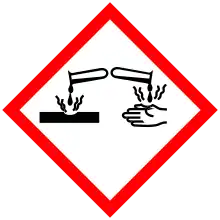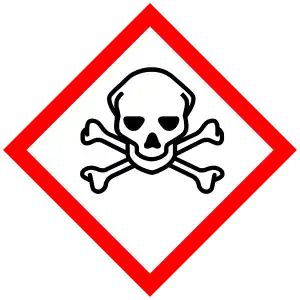1-Aminopentane
1-Aminopentane is an organic compound with the formula CH3(CH2)4NH2. It is used as a solvent, as a raw material in the manufacture of a variety of other compounds, including dyes, emulsifiers, and pharmaceutical products,[1] and as a flavoring agent.[2][3]
| Names | |
|---|---|
| Preferred IUPAC name
Pentan-1-amine | |
| Other names
Pentylamine | |
| Identifiers | |
CAS Number |
|
3D model (JSmol) |
|
Beilstein Reference |
505953 |
| ChEBI | |
| ChemSpider | |
| DrugBank | |
| ECHA InfoCard | 100.003.438 |
| EC Number |
|
| MeSH | n-amylamine |
PubChem CID |
|
| RTECS number |
|
| UNII | |
| UN number | 1106 |
CompTox Dashboard (EPA) |
|
InChI
| |
SMILES
| |
| Properties | |
Chemical formula |
C5H13N |
| Molar mass | 87.166 g·mol−1 |
| Appearance | Colourless liquid |
| Density | 0.752 g mL−1 |
| Melting point | −55 °C; −67 °F; 218 K |
| Boiling point | 94 to 110 °C; 201 to 230 °F; 367 to 383 K |
Solubility in water |
Miscible |
Henry's law constant (kH) |
410 μmol Pa−1 kg−1 |
Magnetic susceptibility (χ) |
-69.4·10−6 cm3/mol |
Refractive index (nD) |
1.411 |
| Thermochemistry | |
Heat capacity (C) |
218 J K−1 mol−1 (at −75 °C) |
| Hazards | |
| GHS labelling: | |
Pictograms |
   |
Signal word |
Danger |
Hazard statements |
H225, H302, H312, H314, H331 |
Precautionary statements |
P210, P261, P280, P305+P351+P338, P310 |
| Flash point | 1 °C (34 °F; 274 K) |
| Explosive limits | 2.2–22% |
| Lethal dose or concentration (LD, LC): | |
LD50 (median dose) |
|
| Related compounds | |
Related alkanamines |
|
Except where otherwise noted, data are given for materials in their standard state (at 25 °C [77 °F], 100 kPa).
Infobox references | |
Pentylamine exhibits reactions typical of other simple alkyl amines, i.e. protonation, alkylation, acylation, condensation with carbonyls. Like other simple aliphatic amines, pentylamine is a weak base: the pKa of [CH3(CH2)4NH3]+ is 10.21.[4]
See also
- 3-Aminopentane
References
- Flick, Ernest W. (1998). Industrial Solvents Handbook (5th ed.). Park Ridge, NJ: William Andrew. p. 695. ISBN 0-8155-1413-1.
- "JECFA Evaluations-PENTYLAMINE. Summary of Evaluations Performed by the Joint FAO/WHO Expert Committee on Food Additives" (January 31, 2006). Retrieved on 2008-07-25
- Karsten Eller, Erhard Henkes, Roland Rossbacher, Hartmut Höke, "Amines, Aliphatic" Ullmann's Encyclopedia of Industrial Chemistry, Wiley-VCH, Weinheim, 2005.doi:10.1002/14356007.a02_001
- H. K. Hall, Jr. (1957). "Correlation of the Base Strengths of Amines". J. Am. Chem. Soc. 79 (20): 5441–5444. doi:10.1021/ja01577a030.
This article is issued from Wikipedia. The text is licensed under Creative Commons - Attribution - Sharealike. Additional terms may apply for the media files.